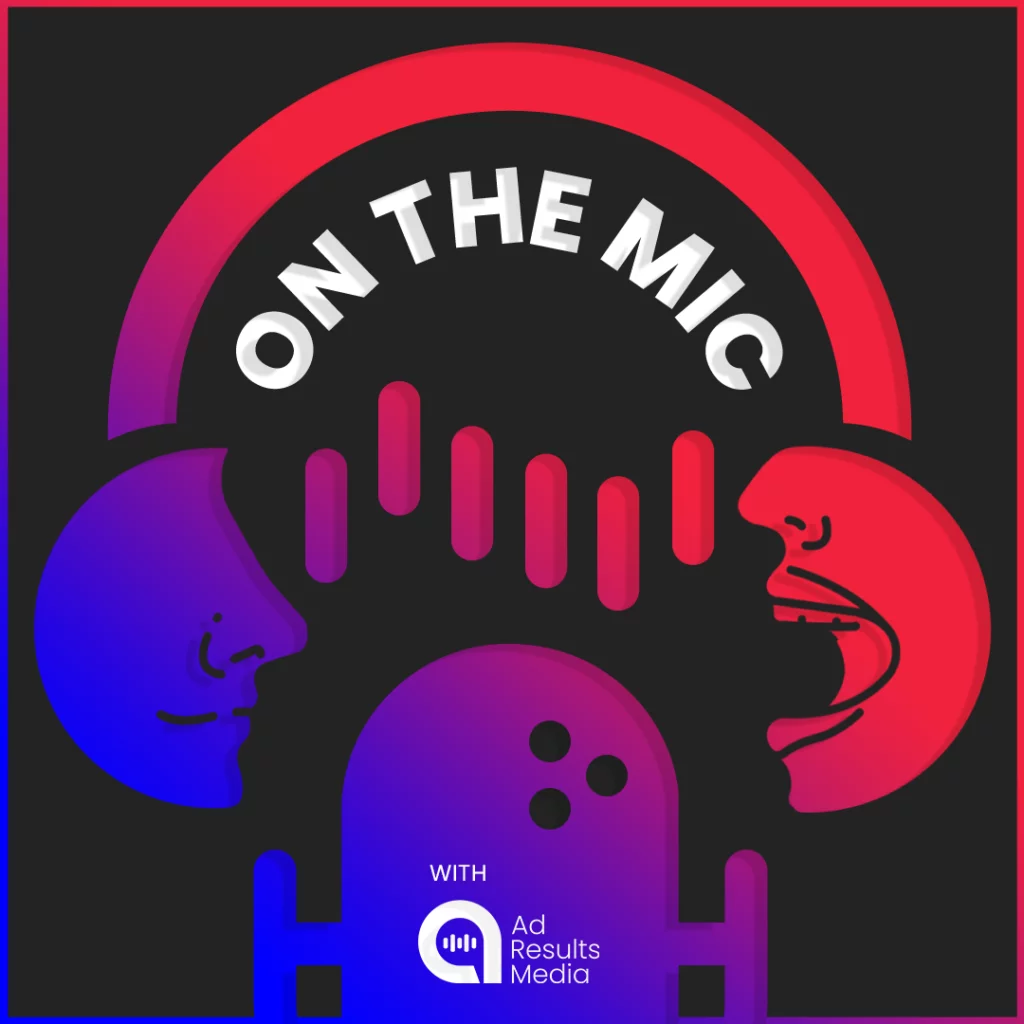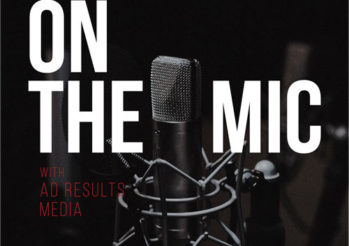Best practices have a tendency to our rule our life, even if you don’t always notice them. There’s the best way to load the dishwasher. There’s the best way to compose an email. There’s the best way to approach an advertising campaign…
But what is what we consider to be best practices are actually hindering us? Utilizing a “one size fits all” approach puts a limit on critical thinking and creativity and when it comes to advertising and creator content, what’s good for the goose definitely isn’t always good for the gander.
In this episode of On the Mic, host Lindsay Smith is joined by Creative Director, Tony Carnevale, and Associate Account Director, Andrea Schwarzbach to discuss best practices, when they’re appropriate, and when we should toss them out the window.
(0s): We actually uses Scribd in our home.
(3s): Do you really love your Sleep Number Bed? And we do.
(23s): It's a best practice for podcasts to start with a prerecorded intro that's put at the beginning of the live recorded content. So in the spirit of this discussion, let's see what happens if we skip all of that and dive right in. Today we're joined by creative director Tony Carneal and associate account director Andrea Schock, to discuss the perks and pitfalls of best practices. So Tony Dre, thanks for joining us. Tony, I wanna start with you specifically. You wrote a blog about this subject, which I hope our listeners get a chance to read. We're gonna link to it in the show notes, but let's start with the basics.
What are best practices and why do you hate them?
(57s): So I do wanna preface this by saying that I think that the core intentions of best practices in general have value. And those core intentions tend to be wanting to pass on knowledge and wisdom that's been gained from past experience. It's about not wanting to have to reinvent the wheel every single day at work. And I totally get that and I value those things as well. What our best practices, best practices are often a list of guidelines, dos and don'ts, that kind of thing.
And as a creative director, there's two main ways that I live with best practices. One is when a client provides me with a list of best practices and another is when someone asks for me to provide them with best practices. And my problem is not so much with the motivation behind the providing of them or the asking for them, but it's about the way the phrase best practices tends to shut down.
Conversation, thought, creativity, critical thinking, all that stuff. The idea that the best practices have been determined and they are the best, has a way of silencing discussion. And as a creative, you know, it is my job to think about what new things to do and the idea that the things that we should do have already been determined by some entity that I may or may not be aware exists in some other universe is anathema to the job that I am paid to do when I'm asked to provide other people with best practices.
Again, I think the intentions are usually good, but I think that it feels like sometimes people are saying, I don't want to have to think about this. Tell me what to do and I want to have to think about about all the stuff. So that in a kind of, in a nutshell is my main issue with the concept of best practices and specifically the phrase best practices.
(3m 9s): Dre, do you have any counter arguments or do you agree with Tony as far as maybe thinking outside of general best practices and processes and, and you know, putting more creative and critical thought into things?
(3m 23s): Yeah, I actually did a little bit of reading before this just to see like what other opinions are out there and I actually read a cool article on LinkedIn. They were talking about how saying the term best practice is sometimes the fault, right? Because you're saying this is ideal for all scenarios when in fact that's never true. There is always at least five outlying situations where it's not best for, and I guess it depends on what you're talking about.
If you're talking about how to enter a schedule into a system, maybe there's only one best practice for that. So I think best practices can serve their purposes in, you know, data entry and different areas, maybe trafficking out creative needs, those best practices. And so there are areas where I think that, like Tony said, they do bring value and I think when we get in a situation where we're putting best practices on strategy for our clients, be it creatively, frequency wise genre that can put us in a box and it doesn't really allow room for people to step outside of that or if people do step outside of that, it's questioned more heavily.
And I think maybe we should call them proven practices based on the article I read because it's something that has been proven to be effective for some situations. And so it is a good practice to try for a given scenario. Again, I think it can vary on which type of best practice we're talking about, but if I'm talking about my world of strategy for my clients and if someone's telling me the best practice is to do a pre-roll at the beginning of a podcast, I would challenge that heavily because my proven practice that I have seen across all clients that we've run with is mid rolls tend to do better.
Specifically if there are multiple mid role positions, just back to back to back the first mid role position tends to do better. But again, some clients do see success with pre-roll, so I would never want to totally rule that out. I would just say let's test mid role first and once we see how that performs, we can also test pre-roll. So just trying to like Tony, I think you hit the nail on the head with critical thinking gets totally eliminated when we put best practices into play around how to do creative, how to strategize for our clients.
There's no one size fits all for every single brand out there and every single situation. And I think that can get lost if we just have best practice docs everywhere for everything we do.
(6m 15s): I completely agree, we have definitely found that when it comes to, you know, sharing copy and trafficking copy with our talents, there are definitely some best ways to go about that. But even just today we had a conversation of how we can evolve and make that even better and you know, optimize on trafficking out that information. So I think that there are some best ways that you can approach it, but I think that you also have to continue to be open to improving your processes and especially like you said, for creative, I have always kind of pushed back on best practices for any sort of produced audio because I have seen things run the gamut.
I have seen founders reads work really well all the way to, we have done some more tongue in cheek reads for more tongue in cheek clients that, you know, works really well for them but wouldn't necessarily work for someone selling like a pair of shoes. So yeah, it, it's very, it's very difficult to kind of box all of those things in as far as creator led advertising, do you think that there are any practices that are particularly useful when approaching kind of planning and you know, on the same page, are there any that are detrimental?
(7m 42s): So I think always trying to make things personalized from the creator perspective is going to lend you to a better read, more engaging for your audience, trying to connect it to your audience because as the creator you should probably know who's listening to your show more than anyone who's writing copy points for you. And being able to relate it to your listeners in any way is going to be maybe not best practice, but it's going to give you the most engagement and in turn it will probably be the best performing.
So I would say that that would probably be my priority for best practice On the creator side.
(8m 24s): Dre, I think what you're saying is absolutely has a lot of merit and I would say that I think part of why it's very persuasive is that you didn't just say, you know, we found that it's best when hosts give an endorsement of the product period. You provided reasoning, you provided background, you provided context explaining why it's a best practice and if a client or someone else came back to you with reasoning or persuasion or some kind of data to indicate why for some reason they thought it was a better idea for their product or service to not have a host endorsement, you know, I don't know what that might be, but let's say hypothetically it exists, then at least you would have these two perspectives that you could compare and contrast and you could do additional research if necessary and it would be the beginning of a conversation if it needed to be rather than the end of one.
So I think what's really valuable when framing what we've learned about creator driven advertising or about anything is to remember why something is a best practice and to be ready to kind of be persuasive about it and provide that that context. The thing that I tend to not like as much is when there's just kind of one line of almost like a biblical commandment and not much background. And in those cases I want that to be the beginning of a conversation rather than the end of it.
And you know, my reaction is often when I see one of those commandments is to ask, who decided this? When was it decided? Has anything changed in the media landscape since then? Spoiler alert, the answer is going to be yes and you know, is this really still the best way to go about things? And, and maybe it is and maybe it isn't. And you don't have to have those conversations every single day. I, I know it would be extremely annoying and counterproductive if you woke up every morning forgetting everything that we had learned and thinking, all right, today I'm going to reestablish what the best practices are for today.
But I think it's, I think it's just something to keep in mind in general. And when you are presented with or or asked for a best practice that maybe rubs you the wrong way or maybe you think is counterintuitive, I think those little blips on your radar might be the opportunity to start asking questions and beginning a conversation.
(10m 49s): So it sounds to me like really what we should be prescribing to everyone is to maybe have the data to back up your practices, but to also be willing to kind of think outside of the box and continue to be creative with your approach. So how should advertisers and agencies go about kind of putting these plans in place, these practices in place to make sure that things are running smoothly but avoiding continuing reinventing the wheel?
(11m 23s): I think it's a good idea to always kind of have that context and reasoning in mind. I think clients that are working with us and looking to us for creative expertise hopefully are doing it because they, they value that kind of input. So I would say, you're already paying for us, you're already paying for me to be helping you out. So that's the first step. So avail yourself of the opportunity to think about things in potentially a new way.
And once you've heard a case made for a new idea, you can feel free to shoot it down and that's totally cool. But I would say be open to new things and I would lobby for the use of some new term in general, other than best practices, this will never happen. Best practices is the phrase is here to stay and it and it will outlive all of us. Yeah, but proven practices is interesting because yes, because multiple things can be proven whereas only one thing can be the best.
So I see the improvement in moving to, to proven practices, you know, this isn't right and it will never be used because it sounds too casual, but in my anti bests practices manifesto, I suggest using the phrase tips and tricks because it sounds very easily challengable and it sounds approachable. You know, I might come up with some tips and tricks and they might work, but by describing something as tips and tricks, there's almost an invitation to other people to provide their own tips and tricks. Again that will never be used in a widespread basis.
But those are some initial thoughts I have to answer that question.
(13m 3s): I like tips and tricks actually. I don't know that if I went to a client saying here's some tips and tricks for strategy around your media, they would like that very much so probably not as approachable from a strategizing point of view, but I tend to agree that they should not be the end all be as far as advertisers and, and even agencies thinking about it. I think you have to be open to new ideas, especially in this industry, everything is changing every day the tech is getting better, the processes have to change because we have to implement, use, use of new tech and be able to improve measurement and find ways to make shows work that move from baked in to di and I think we've been able to adapt very quickly, which is great.
And sometimes when you have best practices in place, adapting can be more challenging. So just always remembering that maybe best practices aren't the best and always keeping an open mind for different ideas and not being afraid to be the challenger. I can give an example of this, I have been working here for almost 10 years and we have as an agency come up with a POV on best practice for testing podcast and frequency.
And then I have a client who came to us and they were already on podcast and they said, actually we find it best when we run two and three spots a month, which is totally opposite from how we tend to buy for our clients and it works for them. There are some shows that cannot sustain the higher frequency, but they're not afraid to test the higher frequency first because if they test it and it drives two to three X conversions for them, then it's a win. And if it doesn't then they bring the frequency down to a level where it's sustaining performance goals.
So that, that to me was very eye opening because I had always thought this is the frequency that we have to do. And experiencing that working for someone was like, oh, well that's not a best practice anymore for me because now I have this new way of potentially doing it. So having clients that are open to trying new things and challenging the norm is also I think a great way to kind of break through those best practices.
(15m 34s): I totally agree. And to your point, Dre, I was thinking about just the quickly evolving nature of our industry and how, you know, when DI spots came into being, it was kind of like, no, they will never be as valuable as, you know, baked in spots that live forever within the episode. And now we're seeing a lot of value in DI and in, you know, being able to buy back catalog and insert ads that are relevant to now rather than listening to, you know, let's say going back and re-listening to cereal.
I'm not saying cereal specifically, I'm just using this as an example, but let's say I go back and re-listen to cereal and I listen to an ad from years ago, you know, just being able to go back and insert spots that are now relevant to today. Or I had a conversation with someone else a few weeks ago about if a show presents a brand safety issue and you've been running with them, you can now you know, strip your spots and then they don't live baked in to that show forever anymore. I would kind of like to get your POV on programmatic because that's also been a big topic of conversation that we've covered on the show.
And again, I think that thinking outside of the box and approaching that creatively is really important as we move forward.
(16m 57s): Yeah, absolutely. I, I know programmatic is a huge goal and focus for our agency to really expand there. And I think in terms of best practices there, I don't know that there can be any right now except to really explore all of the different opportunities and as we continue to work with new partners to get programmatic inventory available, I think there will be more and more options to test into and really it would be about, you know, audience targeting is gonna be a huge part of that.
Being able to target a specific audience will be great. And then trying to get as low of CPMs as possible to make it super efficient. And then on the creative side of things, finding what works best for various clients. Right. I don't think there's gonna be a best practice for programmatic creative, but I do think that it will be a really great opportunity for us to explore some really fun produced spots that our agency hasn't gotten to do as much of before.
(18m 4s): That's exciting. What an exciting opportunity where there aren't yet best practices.
(18m 9s): Right.
(18m 11s): So before we kind of close out this conversation, do y'all have any kind of final thoughts that you want to share that you hope that our listeners take away about best practices? Or maybe we should say proven practices? Tony,
(18m 25s): I would just say I really resonated with something Dre said a little bit earlier. She likes the phrase tips and tricks, but she can't really go into a client call and and say, these are our tips and tricks for your strategy. I think that really underlined a reason that the phrase best practices is so popular and I think it's a valid reason. And that is, you know, in any professional setting, it could be the world of being a lawyer, it could, you know, the world of medicine, whatever you want to convey, complete and total confidence. And part of why I love the phrase tips and tricks is because there's a little bit of vulnerability there.
There's an opportunity for creative thinking and the admission that maybe we're not always right about everything. Whereas with best practices, the phrase best practices conveys a swaggering confidence. That I think is, I understand the value in that, that I think is one reason why it's so powerful. So I'm gonna do some thinking on what's another phrase that conveys that level of confidence, but, but that I hate a little bit less than the phrase best practices. And maybe I'll come back to you and suggest that later on.
(19m 29s): I think I might start using proven practices just going forward. I really like that term and I will just say if we have vendors listening to this network, publisher partners, you guys need to come up with a proven practice on how to sell your DI inventory because all of you do it differently and it makes it really challenging from a strategy point of view and a media planning point of view to give my best practice or proven practice or recommendation to a client when it is all different.
You all do it differently. I need you to standardize it, I need it to improve. So proven practice for selling di let's go.
(20m 10s): Love that. Getting it done.
(20m 12s): All right. Just putting it out there for him. And I, I do think that there is absolutely value in, in standardizing certain practices. I wanted to thank y'all for joining. I have really enjoyed this conversation and and really hearing kind of how y'all approach things. I definitely think one of the key takeaways here is don't process things to death. Allow room for evolution and critical thinking and creative thinking and what works for one person may not work for you and that's okay.
So thank you guys so much. I really appreciate it. I am looking forward to feedback from other folks, hopefully networks on standardizing their DI
(20m 57s): Practices. Yep, you heard it here first. Thank you for having me. I always love coming on. I love this topic and I'm glad we could finally make it happen. Yes,
(21m 8s): Same. Thanks so much for having us. This was really fun.
(21m 13s): We hope you enjoyed the episode. If you did, do us a favor and share it on your social feed of choice.
(21m 18s): And for a limited time, click the subscribe button to get the latest episode sent right to your favorite podcast app.
(21m 24s): Okay. So there's not really a time limit, but what would a show like ours Speed without a bit of urgency sprinkled on top of the call to action.
(21m 31s): While you're at it, please leave us a review. We'd love to hear your thoughts, questions, or ideas for future episodes. So feel free to email us directly at on the mic@adresultsmedia.com.
(21m 41s): On the mic is hosted by Lindsay Smith and Nate Spell, edited by Jeffrey Stallings and produced by Ad Results Media. For more information about Ad results media, go to adresultsmedia.com or follow us on Twitter, Instagram and LinkedIn.
(21m 55s): We're proud to be a part of the Ad Week podcast network and Acast Creator Network. Find more podcasts like this one at ad week.com/podcasts.




